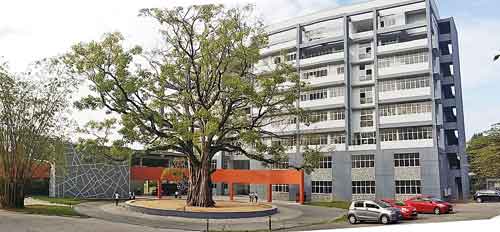J’Pura Medical Science Faculty marks 25 years
View(s): The Faculty of Medical Sciences (FMS) of the University of Sri Jayewardenepura (USJP) will complete 25 years in March.
The Faculty of Medical Sciences (FMS) of the University of Sri Jayewardenepura (USJP) will complete 25 years in March.
To commemorate this important milestone and to mark the occupation of the faculty’s newly-constructed Phase IV building an all-night pirith ceremony was held on Friday with the participation of the monks led by the Chancellor Ven. Prof. Bellanwila Wimalaratana Nayaka Thera followed by an alms-giving yesterday in the new building complex.
The establishment of a Faculty of Medical Sciences to conduct an undergraduate course for the MBBS and B.Sc course in Human Biology was approved in July 1992. Dr. H.H.R. Samarasinghe was appointed Coordinator of the new faculty which was opened on March 1, 1993, with 139 students being registered for the MBBS course.
As the first Faculty of Medical Sciences in Sri Lanka, it plays a leading role in training the entire team of health professionals required for the country.
The faculty offers five undergraduate courses — Bachelor of Medicine and Bachelor of Surgery (MBBS); B.Sc Honours in Human Biology; B.Sc Honours in Nursing; B.Sc Honours in Medical Laboratory Sciences and Bachelor of Pharmacy Honours. Currently, there are 1,287 undergraduate students following different degree programmes at the faculty. Each year, a batch of 160 students enters the faculty to follow the MBBS degree programme and 75 for the paramedical degree programmes. All these courses are conducted in English.
The Faculty has 17 academic departments and three paramedical units which are staffed by 43 Lecturers, 72 Senior Lecturers and 27 Professors in addition to an extended faculty consisting of Consultants from the Health Ministry. In addition, the clinical and para-clinical staff is involved in patient-care activities.
The late Prof. M.T.M. Jiffry assumed duties as the first Dean in January 1996, followed by the late Prof. Dayasiri Fernando, Prof. Narada Warnasuriya, Prof. Jayanta Jayawardena and Prof. Mohan de Silva.
The Phase IV building complex project has been completed under the current Dean Prof. Surangi Yasawardene and Vice Chancellor Prof. Sampath Ameratunga.
The students undergo clinical teaching at the Colombo South Teaching Hospital, the Sri Jayewardenepura General Hospital and the Homagama Base Hospital, while the National Cancer Institute, Maharagama, the National Institute of Mental Health, Angoda and certain special units of the National Hospital of Sri Lanka are also used in the clinical training. The Health Ministry Consultants working in these hospitals make the extended faculty under whom the students undergo their clinical training. Community Health training in the Community Health Unit is also mandatory.
The faculty also offers an extensive training programme in Family Medicine at a purpose-built modern Family Practice Centre which serves the health care needs of more than 2000 families in the vicinity at a minimum cost.
The faculty also offers M.Phil and Ph.D degrees mostly in medical and allied health sciences.
Meanwhile, research collaborations have been established with key international research groups and laboratories such as the University of Oxford, the National University of Singapore, the Faculty of Medicine, University of Trondheim Norway, the Gothenburg University and the University of Uppsala, Sweden to address national priorities and current global issues.
The Linnaeus-Palme Student and Teacher Exchange Programme with the Kristianstad University, Sweden, has been functioning for the past five years.
The foreign exchange students’ elective programme attracts many foreign students for training in the faculty as undergraduates and post-graduates to study diseases and services available in a middle-income and tropical country.
The faculty has progressed rapidly to become one of the most sought after medical faculties in the country. In line with the faculty’s strategic intent to be the best medical faculty in Sri Lanka and to be rated as one of the best in South East Asia, it is pursuing an ambitious programme to develop its infrastructure and research facilities to be on par with the best universities in the Asian sub-continent.


